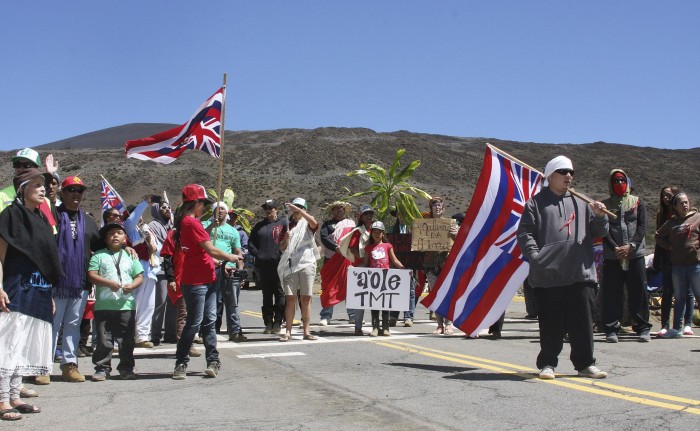The position taken by Mauna Kea protectors that the building of the 30-meter telescope is a desecration of sacred land is firmly grounded in international law. Because the Hawaiian Kingdom has been under an illegal and prolonged occupation by the United States since the Spanish-American War in 1898, the international laws of occupation apply to Hawai‘i’s situation and not United States law.
International law prohibits a neutral country from being occupied when two or more other countries are at war with each other. In other words, the United States was prohibited from occupying the Hawaiian Kingdom, being an internationally recognized neutral country since 1854, in its war against Spain in 1898. Despite the violation of international law, the laws of occupation mandates the occupier to temporarily administer the laws of the occupied State until the occupation comes to an end.
During the Spanish-American War the laws of war and occupation of countries were considered customary international law and in 1899, The Hague Conventions codified these laws into four treaties. In 1907, The Hague Conventions were revised into fifteen treaties. The United States ratified all of the Hague Conventions. The 1907 Hague Convention, IV—Respecting the Laws and Customs of War on Land, applies to Hawai‘i’s occupation even if Hawai‘i is not a war with the United States.
Article 43 mandates the occupier “shall take all the measures in his power to restore, and ensure, as far as possible, public order and safety, while respecting, unless absolutely prevented, the laws in force in the country.” In addition, Article 56 specifically protects “institutions dedicated to religion, charity and education, [and] the arts and sciences. All seizure of, destruction or willful damage done to institutions of this character, historic monuments, works of art and science, is forbidden, and should be made the subject of legal proceedings.” The United States military considers violations of the provisions of the Hague Convention, IV, to be war crimes. Section 499 of the U.S. Army FM 27-10 states, “The term ‘war crime’ is the technical expression for a violation of the law of war by any person or persons, military or civilian. Every violation of the law of war is a war crime.”
The Mauna Kea protectors have generated worldwide awareness, much through social media, in order to prevent the building of a 30-meter telescope on the revered mountain in the Hawaiian Kingdom called Mauna Kea. Some are calling this the “Hawaiian Spring” that has similar traits to the “Arab Spring” where the younger generation in the Arab world was mobilized through social media to protest and demonstrate against undemocratic rule.
The developers of this would be 18-story telescope is TMT International Observatory (TIO) that was formed in 2014. Presently TIO is a partnership of six international organizations—the California Institute of Technology (USA), the National Institutes of Natural Science (Japan), the National Astronomical Observatories of the Chinese Academy of Science (China), the Regents of the University of California (USA), the Association of Canadian Universities for Research in Astronomy (Canada), and the Indian Institute of Astrophysics (India).
The proposed development began in 2010. According to the TMT website, “TMT completed an Environmental Impact Statement, after 14 community meetings, and it was signed by the Governor of Hawaii. The Cultural Impact Statement, as key part of the document, included consultations with Native Hawaiian cultural practitioners. No groups or individuals challenged the contents or process of this important and required document.”
TMT also stated that in 2013, “the Kahu Ku Mauna Council, made up of local Native Hawaiian cultural practitioners approved the University of Hawaii granting a sublease to TMT to build on Mauna Kea. The University of Hawaii Board of Regents, after another public hearing, agreed.” The following year, “the Hawaii Board of Land and Natural Resources voted to approve the sublease for the TMT site.”
Mauna Kea is government land of the Hawaiian Kingdom and in 1848 it came under the administration of the Minister of the Interior under An Act Relating to the Lands of His Majesty the King and of the Government. The Act states, “And we do hereby appoint the Minister of the Interior and his successors in office, to direct, superintend, and dispose of said lands, as provided in the Act to organize the Executive Departments… Provided, however, that the Minister of the Interior and his successors in office shall have the power, upon the approval of the King in Privy Council, to dispose of the government lands to Hawaiian subjects, upon such other terms and conditions as to him and the King in Privy Council, may seem best for the promotion of agriculture, and the best interests of the Hawaiian Kingdom.” By an Act in 1854, the Hawaiian Legislature allowed foreign nationals to own property in the Kingdom, but subject to Hawaiian law.
On October 18, 1893, a Presidential investigation concluded that the United States diplomat assigned to the Hawaiian Kingdom, John Stevens, and Naval Captain Gilbert Wiltse were directly responsible for the illegal overthrow of the Hawaiian Kingdom government that occurred on January 17, 1893. On December 18, President Cleveland entered into an executive agreement to reinstate Queen Lili‘uokalani and her cabinet but due to political wrangling in the Congress, Cleveland was not able carry out the agreement. What was on the minds of the Congress was to secure the Hawaiian Islands as a military outpost in order to protect the American west coast from foreign invasion.
Unable to secure a treaty of annexation, the United States Congress unilaterally seized the Hawaiian Islands during the Spanish-American War under what a Senator called a war necessity. The United States claim to sovereignty over the Hawaiian Islands relies on a congressional joint resolution of annexation that was signed into U.S. law by President McKinley on July 7, 1898. The underlying problem that congressmen at the time knew was that no law of Congress can have any force and effect beyond the borders of the United States. In other words, the United States could no more annex the Hawaiian Islands by passing a domestic law, than it could annex Canada today by passing a law. American diplomats and revisionist historians took measures to conceal this from the world. Today, the Hawaiian Islands serves as headquarters for the largest United States combatant unified command in the world called the U.S. Pacific Command, and 20% of the Hawaiian Islands come under the direct control of U.S. troops.
On January 17, 1893, U.S. forces seized the Hawaiian Kingdom government by illegally removing the Queen, as the chief executive officer, and her cabinet of ministers, and replaced them with insurgents. All other officials and employees in the executive and judicial branches of government were then forced to sign oaths of allegiance to the insurgents under threat by U.S. troops. This is called regime change.
The Hawaiian Kingdom government was renamed to the self-declared provisional government on January 17, 1893. On July 4, 1894, the same insurgents renamed themselves to be the Republic of Hawai‘i. By an Act of Congress on April 30, 1900, the so-called Republic of Hawai‘i was renamed the “Territory of Hawai‘i,” and by another Act of Congress on March 18, 1959, it was renamed the “State of Hawai‘i.” Interestingly, the Congress passed a joint resolution on November 23, 1993, apologizing for the illegal overthrow of the Hawaiian Kingdom government, and specifically called the Republic of Hawai‘i “self-declared.” Self-declared means it wasn’t a government a lawful government. So if the so-called Republic of Hawai‘i was self-declared, then its successors are self-declared as well since the so-called Territorial and State of Hawai‘i government can claim no U.S. authority if Congressional laws have no effect beyond U.S. borders.
Simply said, the Hawaiian Kingdom government was carjacked and merely painted red, white and blue.
In light of this important historical and legal information, TIO cannot claim to have a valid lease from the States of Hawai‘i to build the 30-meter telescope if the State of Hawai‘i is self-declared. Only a U.S. military governor established under the laws of occupation and temporarily acting in the capacity of the Hawaiian Kingdom’s Minister of the Interior could enter into a lease, but only after hearings and public input is gathered under Hawaiian Kingdom law and not the laws of the United States. The issue is not whether or not the 30-meter telescope should be built on Mauna Kea, but rather have Hawaiian laws been complied with that would allow or not allow the construction of the telescope. Should TIO disregard the law they would be prosecuted for war crimes.




Since the U.S. chose to occupy the Hawaiian Islands, a neutral state,
back in 1898, during the Spanish and American war would Spain have
any recourse because of that unlawful disadvantage caused by the U.S.?
The article says, “The issue is not whether or not the 30-meter telescope should be built on Mauna Kea, but rather have Hawaiian laws been complied with that would allow or not allow the construction of the telescope. Should TIO disregard the law they would be prosecuted for war crimes.”
It seems to me that the issue is BOTH of these matters, not merely the issue of legality. Is it not a question of “what is pono and what is not?” Is not pono the basis of Hawaiian law? The people say, “not pono!”
Pedant and possibly small point alert….. The headline “prevents constructions” could be modified. IL doesn’t or may not, “prevent” in the commonly held sense. “Forbids” IL does and “prevents lawful construction” it does. This article puts all States [in the international sense], and their nationals, on notice of their complicity in these war crimes should they participate in the construction and/or operation, at the offending site.
On a purely practical point, since space telescopy [i.e. Hubble-type “telescopes”] these facilities are unnecessary, so any possible defense of “necessity” to the charges of war crimes would be unpersuasive.
well done!
IMHO, the USPACOM has the obligation and duty to ensure compliance with the laws of occupation, laws of war, international law, Geneva and Hague conventions. They are responsible for the prevention, investigation and prosecution of War Crimes.They need to stop the violations of the Hague Convention, IV, which are war crimes being committed by the TMT construction workers. Section 499 of the U.S. Army FM 27-10 states, “The term ‘war crime’ is the technical expression for a violation of the law of war by any person or persons, military or civilian. Every violation of the law of war is a war crime.” The TMT construction workers are in violation of Article 56 because they are destroying “institutions dedicated to religion, charity and education, [and] the arts and sciences. All seizure of, destruction or willful damage done to institutions of this character, historic monuments, works of art and science, is forbidden, and should be made the subject of legal proceedings.”
The whole purpose for the puppet self proclaimed State of Hawaii gov’t is to be the buffer for the U.S. military so they don’t need to be involved. It is their slide of hand tactic to avoid addressing the war crimes being committed on their watch. There should be a shift of focus onto the U.S. military. The commander of the military for Hawaii Island should be put on notice by protest and demand. Once it’s documented that the Hawaii Island commander has been noticed then it’s his call if he will be in compliance to the law or violate the law. It’s time to hold these guys accountable to do their duty under the Treaties, Geneva and Hague Conventions and their own U.S. Army Field Manual. Their military base at Pohakuloa is only minutes from Mauna Kea. The U.S. military should be the one preventing the TMT construction workers from driving up Mauna Kea to committ war crimes and not the protectors of Mauna Kea, who end up getting arrested and become victims of war crimes themselves for doing what the U.S. military should have been doing. Make them part of the discussion, even with talks involving the protectors, TMT, state officials, police and county officials.
And speaking of war crimes, what about the depleted uranium all over Pohakuloa?
Mahalo for your input and information, Kekoa. You made some very valid points and I’m in agreement with you. I’m in a position where I’m able to reach the Commander of the Pacific. I will take the initiative to make him aware of the issue at hand and see where it goes from there.
Mahalo Lori H.
So thankful and grateful Dr. Keanu Sai was created to educate and empower especially those of us who had the wool pulled over their eyes in Hawaii schools. Aloha ke Akua!
Exactly! Just like I said last time, I too am not saying that telescopes should not be built on Mauna Kea. Its just if it should be built, it should be done under the law. Not only with international laws pertaining to Hawaii’s situation, but H.K. law as well. In fact, if we were not occupied and the H.K. Government was in power, they generally would do what is right for the common good of the nation (In fact, that’s a law. ARTICLE 13 of the Constitution to be exact). So for instance if the H.K. Government wants to built telescopes or something else on Mauna Kea, that is their choice so as long as that decision is governed under Hawaiian law.
In the end, the H.K. Government, when restored, will do what is right for the common good of the nation in all aspects of life (economically, socially, etc). Note also that if one wants to run for government, as a Representative of the people that is since Nobles are appointed by the King (ARTICLE 57 of the Constitution), one who would be eligible for Representative have to be a Hawaiian subject or a denizen subject of the H.K., they have to be at least age 25, know how to read and write and know accounts, have to reside in the H.K. for at least 1 year immediately preceding his/her election, they cannot be convicted of any crime or misdemeanor, and above all, they cannot be insane or an idiot. (ARTICLE 61 of the Constitution)
(Personally, I hope laws such as ARTICLE 61, ARTICLE 62, and ARTICLE 25, for example, do not change when the H.K. Government is restored. I have a feeling with those kind laws, Hawaii will be a much prospered and intellectual society. Far better than this occupation)
“cannot be insane or an idiot.” Unlike those who currently run the US government! LOL
I don’t know about that, but most defiantly the people in the puppet government (State of Hawaii) do fit that category! lol!
kkklklk
Whats more black and white is there
Wrong is wrong
Stop mistaking kindness for weakness
Move on
HAWAIIAN KINGDOM
NA KUPUNA MOKU O KEAWE
NOTICE OF TRESPASS
You are hereby noticed that this property located on the Northern Plateau of Mauna Kea, Island of Hawaii lawfully belongs to the Hawaiian Kingdom Government and no permission has been granted by said Government for its use or conversion.
It is by Presumption of Fact that the Hawaiian Kingdom continues to exist and that there is no evidence of any lawful document or treaty of cession to the contrary.
It is therefore the demand that you
CEASE AND DESIST AND VACATE THE PREMISES IMMEDIATELY.
RAMIFICATIONS FOR
FAILURE TO COMPLY
Should you fail to comply with this notice and demand, know that you do so with complete knowledge of personal liabilities for yourselves and your partner corporations.
You may be personally liable for Fraudulent Conversion along with personal violations of International Laws regarding Pillage.
Further note that any and all structures placed on said property is subject to confiscation without financial compensation.
This action is being taken by Na Kupuna Moku O Keawe and that all information shall be transmitted to the acting Hawaiian Kingdom Government.
Hanalei Fergerstrom
Na Kupuna Moku O Keawe
P.O. Box 951
Kurtistown, Hawaii 96760
808 938-994 Dated: 10-7-2014